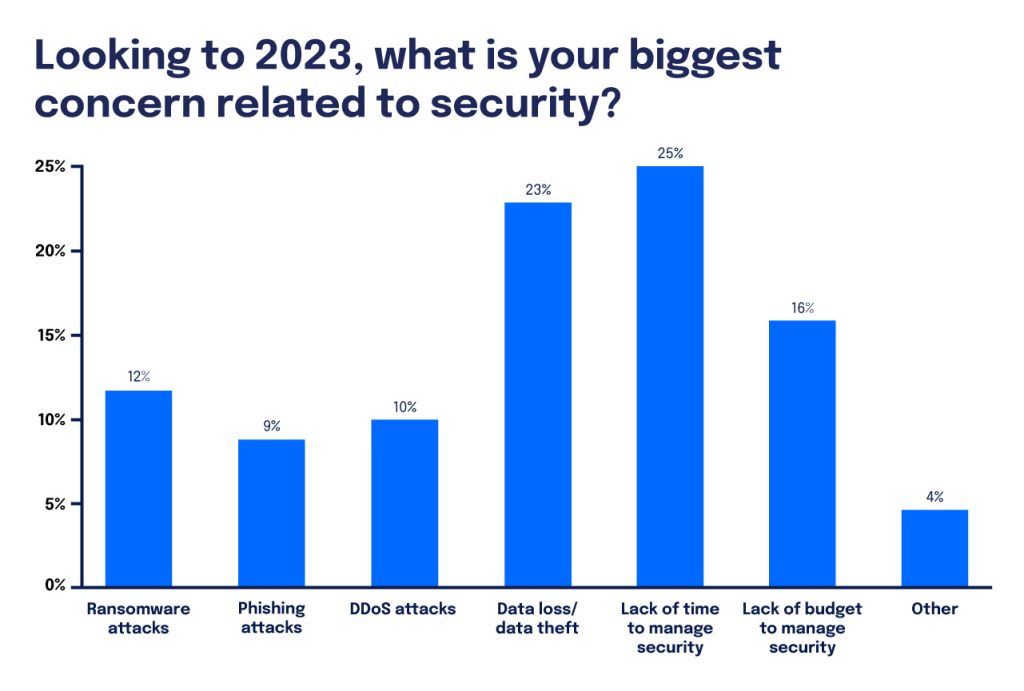
In the dangerous world of cyber threats, being a small business can sometimes feel like bringing a wooden sword to fight the devil. According to a report from DigitalOcean, the average cost of a cyberattack for Small and Midsize Businesses (SMBs) in 2023 was $200,000, which is a significant increase from the previous year. The report found that 25% of SMBs were concerned about lack of time to manage security, 23% were worried about data loss or data theft, 12% feared ransomware attacks, and 10% were anxious about DDoS attacks.

Based on these findings, you can safely say that cybersecurity is not just an option but a necessity for SMBs. It can help them protect their assets, reputation, and customers, as well as gain a competitive edge in the market. In this article, we will cover some of the cybersecurity basics that SMBs must know and implement. Cybersecurity Basics for SMBs is not just a buzzword; it’s the safeguard that keeps your business resilient against an ever-evolving threat landscape. Here’s why:
Understanding the Threat Landscape
The first step to improving your cybersecurity is to understand the threat landscape that you are facing. This means knowing who your adversaries are, what their motives and capabilities are, and what their attack vectors and methods are.
Some of the common types of cyberattacks that SMBs face are:
- Phishing: This is when cybercriminals send fraudulent emails or messages that appear to be from legitimate sources, such as banks, suppliers, or customers. They trick you into clicking on malicious links or attachments or providing sensitive information, such as passwords or credit card details.
- Ransomware: Once the cybercriminals have acquired your important credentials to access your system, they can deploy Ransomware attacks. This is when cybercriminals encrypt your data or lock your systems, and demand a ransom for their release. They may also threaten to delete or expose your data if you do not pay.
- Distributed Denial of Service (DDoS) Attacks: This is when cybercriminals flood your website or network with excessive traffic or requests, causing them to slow down or crash. They may do this to disrupt your business operations, extort money from you, or divert your attention from other attacks.
- Data Breach: This is when cybercriminals access your data without your authorization, either by hacking your systems or by exploiting insider threats. They may use your data for identity theft, fraud, espionage, or sabotage.
How to Protect SMBs from Cyber Threats?

Below are some seemingly complex measures that all SMBs should take to protect their business. Although they seem like complex measures, we will explain how SMBs can easily accomplish them.
- Data Protection: Data is one of your most valuable assets as a business. It includes your customer information, financial records, intellectual property, trade secrets, and more. Protecting sensitive customer data and proprietary information is paramount. SMBs must invest in encryption, access controls, and data classification to ensure that sensitive data is safeguarded from unauthorized access. In addition, regulatory compliance, such as GDPR and HIPAA, may require specific data protection measures.
- Firewall and Antivirus Solutions: Firewall and antivirus solutions can help you detect, block, and remove malicious software or traffic that may harm your systems or data. Firewalls and antivirus software act as a protective barrier between your network and potential threats. Implement robust firewall solutions, and the state-of-the-art Endpoint Detection & Response (EDR) as your anti-virus solution to not only block Ransomware but revert to pre-infection state if your systems are compromised.
- Strong Password Practices: Passwords are one of the most common ways to authenticate users and protect online accounts. However, passwords are also one of the most vulnerable ways to do so. Cybercriminals can easily crack or steal passwords using various techniques, such as brute force, dictionary, or social engineering attacks. Encourage the use of strong, unique passwords and consider implementing multi-factor authentication (MFA) wherever possible. Password managers can help employees maintain secure credentials.
- Regular Software Updates: Software updates can help you improve your cybersecurity and performance by fixing bugs, vulnerabilities, and errors, as well as adding new features and functionalities. Outdated software is a known vulnerability that cyber attackers exploit. Ensure that all software, including operating systems, applications, and plugins, is regularly updated with the latest security patches. Automate this process to reduce the risk of oversight.
- Data Backup and Recovery: Data backup and recovery can help you improve your cybersecurity and resilience by ensuring that you always have access to your data. In the event of a cyber incident, having a reliable data backup and recovery plan is essential. Regularly back up critical data to secure, offsite locations, and test the restoration process to ensure business continuity in case of data loss.
- Incident Response Plan: An incident response plan can help you improve your cybersecurity and readiness by minimizing the impact and consequences of a cyber incident. No organization is immune to cyberattacks, and it’s crucial to have a well-defined incident response plan. This plan outlines the steps to take when a security breach occurs, minimizing damage and downtime. Regularly review and update this plan to stay prepared for new threats.
- User Training and Awareness: Users are often the weakest link in cybersecurity. They may unintentionally expose your business to cyber risks by clicking on phishing links, using weak passwords, sharing sensitive information, or downloading malicious software. Your employees are often the first line of defense against cyber threats. Educating your staff about cybersecurity best practices, such as identifying phishing emails and using secure passwords, is essential. Regular training and awareness programs can significantly reduce the risk of human error leading to security breaches.
- Cyber Security Insurance: Cyber Security Insurance is a vital safeguard for SMBs. It provides financial protection in case of cyberattacks, covering expenses like data breach response, data restoration, business interruption, legal and regulatory costs, and even ransomware payments. This insurance ensures that when faced with the financial fallout of a cyber incident, your business can recover and continue operating without severe financial setbacks. It’s a smart investment for SMBs in today’s cyber-threat landscape.
But this sounds complicated!
The above-mentioned safety measures sound complex, don’t they? Well, many of these measures can be implemented without too much trouble. For example, if you subscribe to Microsoft 365 cloud services for your email and documents, you could leverage some of the available options within Microsoft Cloud to protect your business. A good IT consultant can advise you in this regard. Also refer to CRES Cyber Security Services.
Conclusion
Cybersecurity measures are no longer optional for SMBs; they are a fundamental necessity. Ignoring cybersecurity can result in devastating consequences, including data breaches, financial losses, and damage to your reputation. By understanding the threat landscape and implementing essential cybersecurity practices, such as data protection, user training, strong passwords, software updates, firewall solutions, data backup, incident response planning, and third-party security partnerships, SMBs can fortify their defenses and thrive in the digital age. Don’t wait until it’s too late—prioritize cybersecurity today to secure the future of your business.
How we can help:
CRES Technology ensures to keep your network and data protected so that you can feel secure and confident.

Many of our clients were in danger of becoming a victim of cyber security attacks. They needed IT security to help prevent attacks from ever happening and help them recover if an attack did happen. That’s where CRES Cyber Security comes in.
With our extensive capabilities in cyber security and partnership with top cyber security software companies, we enable you to prevent cyber attacks, network exploitation, data breaches, phishing emails, and more. Our RMM audit assesses the health of your network and resources. We offer network penetration testing to prevent network exploitation, implement data loss prevention policies to prevent data breaches, and phishing email testing to teach your staff to identify phishing emails. CRES Technology implements state-of-the-art Endpoint Detection and Response solutions, allowing your company to be able to recover from any kind of damage caused by cybercriminals.
About Irfan Butt

CRES Technology – Founder and CEO
A strategic leader with over twenty years of progressive experience in Business Administration, Finance, Product Development, and Project Management. Irfan has a proven track record in a broad range of industries including hospitality, real estate, banking, finance, and management consulting.